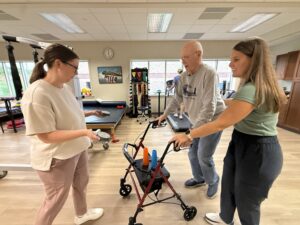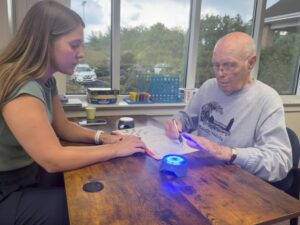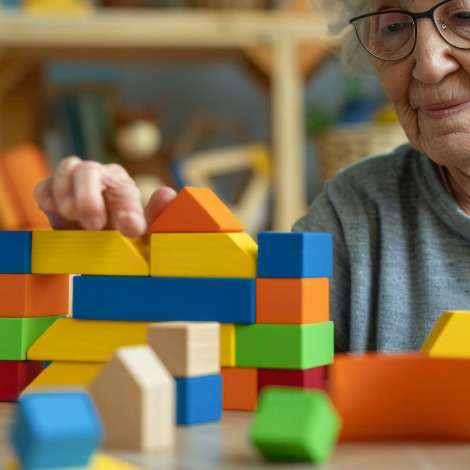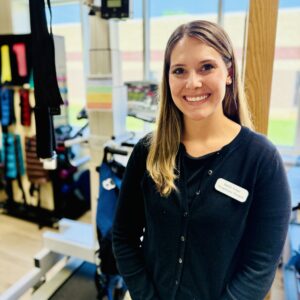Outpatient Neurological Occupational Therapy
 HARTZ Physical Therapy is proud to expand our services to include full-service outpatient Neurological Occupational Therapy (OT)—now available at our Lancaster West location. Our Neurological Occupational Therapy program is designed to support individuals recovering from neurological conditions that affect their ability to perform everyday activities. Our goal is to help each patient regain independence, confidence, and quality of life through customized, compassionate care.
HARTZ Physical Therapy is proud to expand our services to include full-service outpatient Neurological Occupational Therapy (OT)—now available at our Lancaster West location. Our Neurological Occupational Therapy program is designed to support individuals recovering from neurological conditions that affect their ability to perform everyday activities. Our goal is to help each patient regain independence, confidence, and quality of life through customized, compassionate care.
There is a growing need in Lancaster County for specialized neurological rehabilitation. Our new OT services are designed to help individuals recovering from conditions such as stroke, brain injury, Parkinson’s disease, multiple sclerosis, and other neurological disorders. The goal: to regain function, increase independence, and improve quality of life after a serious medical event.
Our occupational therapist works closely with both patients and caregivers to support daily function and long-term progress. Just like our Neurological Physical Therapy program, our OT services are patient-centered and outcome-driven.
Together, our physical and occupational therapists create a collaborative circle of care, ensuring patients receive integrated, personalized treatment plans that address their unique needs—every step of the way.
What Is Neurological Occupational Therapy?
Neurological Occupational Therapy helps individuals regain or adapt the skills needed for everyday life after a neurological injury or diagnosis. Whether it’s trouble with movement, memory, coordination, or vision, we work together to build strategies that support greater independence and safety in daily routines.
Our neurological therapy program specializes in treating patients with the following diagnoses:
- Stroke (Cerebral Vascular Accident CVA)
- Traumatic brain injury (TBI)
- Amputation
- Spinal cord injury (SCI)
- Parkinson’s Disease
- Multiple Sclerosis
- Vestibular Disorders
- Balance Disorders
- Dystonia
- Mild Brain Injury/Concussion
- Guillain-Barre Syndrome
- Peripheral Neuropathy
- Cerebellar Ataxia
Occupational Therapy Helps With:
- Activity of Daily Living (ADL) Safety & Independence
- Instrumental Activities of Daily Living (IADL)
- Adapative or Durable Medical Equipment Education
- Cognitive / Executive Functioning Skills
- Sensory / Neuromuscular Re-education
- Energy Conservation Techniques
- Coordination & Balance
- Visual Perceptual Training
- Visual Motor Skills
- Strengthening
- Pain Management
Return to Driving Evaluations
 Driving is an important part of independence, but medical changes can sometimes make it unsafe or overwhelming. As an occupational therapist with advanced training in driving evaluations, Emily can provide clinical assessments to help determine if someone is safe to return to driving. She will work with individuals who have experienced stroke, brain injury, other neurological conditions, or who may simply have concerns related to aging. Her role as an OT is to assess skills, address areas of difficulty through therapy, and connect patients with the right resources if further evaluation is needed. Together, she can help you or a loved one ensure greater safety and confidence on the road.
Driving is an important part of independence, but medical changes can sometimes make it unsafe or overwhelming. As an occupational therapist with advanced training in driving evaluations, Emily can provide clinical assessments to help determine if someone is safe to return to driving. She will work with individuals who have experienced stroke, brain injury, other neurological conditions, or who may simply have concerns related to aging. Her role as an OT is to assess skills, address areas of difficulty through therapy, and connect patients with the right resources if further evaluation is needed. Together, she can help you or a loved one ensure greater safety and confidence on the road.
What to Expect in a Clinical Driving Evaluation
Your evaluation will help determine if you can safely continue driving, return to driving, or if you may benefit from adaptive equipment or training.
Step 1: Before You Arrive
- Bring your driver’s license, glasses, and any required medical paperwork.
- Bring a list of your current medications.
Step 2: Clinical (In-Office) Assessment
Emily will check the skills needed for safe driving:
- Review your medical history and driving background
- Vision screening (sharpness, side vision, depth perception)
- Thinking and memory tests (attention, problem-solving, reaction speed)
- Physical ability (strength, range of motion, coordination, reflexes)
- Sensation (feeling in your hands and feet)
- Reaction time using simple tools
- Road sign and traffic rule recognition
Step 3: Recommendations
At the end, the Emily will discuss results and may recommend:
✅ Recommend an on-road evaluation (if needed)
✅ Continue driving as usual
✅ Drive with restrictions (daytime only, local roads, etc.)
✅ Use adaptive equipment (hand controls, special mirrors, left-foot accelerator, etc.)
✅ Suggest additional driving training
This evaluation is meant to support your independence and safety. Emily’s goal is to help you drive safely for as long as possible—or find safe alternatives if needed.
What to Expect
Occupational therapy appointments are tailored to each patient’s unique needs, symptoms, and goals.
Every visit may include:
- Manual techniques to improve mobility and reduce pain or spasticity
- Neuromuscular re-education to retrain movement patterns and brain-body coordination
- Targeted therapeutic exercise to strengthen affected areas
- Cognitive and visual-perceptual training to improve attention, memory, and safety awareness
- Adaptive strategies for daily living tasks such as dressing, grooming, or cooking
- Caregiver education and home exercise programs to support progress outside the clinic
OCCUPATIONAL THERAPY CHECKLIST
Have you or a loved one been struggling with daily tasks like getting dressed, staying organized, or remembering important steps in a routine? These challenges can feel overwhelming—but they may also be signs that neurological occupational therapy can help.
Take Our Quick Checklist to See If Neuro OT Is Right for You
Our checklist can help you identify:
✅ Difficulty with fine motor tasks like buttoning a shirt
✅ Memory issues or forgetfulness with daily routines
✅ Trouble staying focused or completing tasks
✅ Increased dependence on others for everyday activities
✅ Fatigue or frustration with once-simple responsibilities
Our neurologically focused OT services use evidence-based strategies and task-specific exercises to improve coordination, cognition, and independence.
Use the checklist today—and take the first step toward more confident living.
DAILY TASKS
☐ Self-care (dressing, bathing)
☐ Pet care
☐ Household tasks
☐ Grocery shopping
WEAKNESS/PAIN
☐ Dressing
☐ Brushing teeth
☐ Preparing meals
☐ General independence
FINE MOTOR SKILLS
☐ Picking up small items
☐ Using zippers/fasteners
☐ Handwriting
☐ Coordination/dexterity
☐ Opening containers
LARGER MOVEMENTS
☐ Reaching overhead
☐ Balance when reaching low
☐ Folding or hanging clothes
☐ Getting in and out of the car, tub, shower, or off the toilet
THINKING / MEMORY
☐ Organizing daily routine
☐ Memory deficits
☐ Difficulty focusing
☐ Difficulty sequencing tasks
VISION: symptoms handled outside of optometry
☐ Bumping into objects
☐ Eye-hand coordination
☐ Double vision
☐ Noticeable vision shifts when moving your head
To download a printable version of our checklist, CLICK HERE.



 Reach out today to learn how OT can help you or someone you care about get back to living with more confidence and control.
Reach out today to learn how OT can help you or someone you care about get back to living with more confidence and control.
If you have questions or would like a FREE phone consultation, please reach out to our Occupational Therapist Emily Beck at 717-735-8880 or at ebeck@hartzpt.com.
